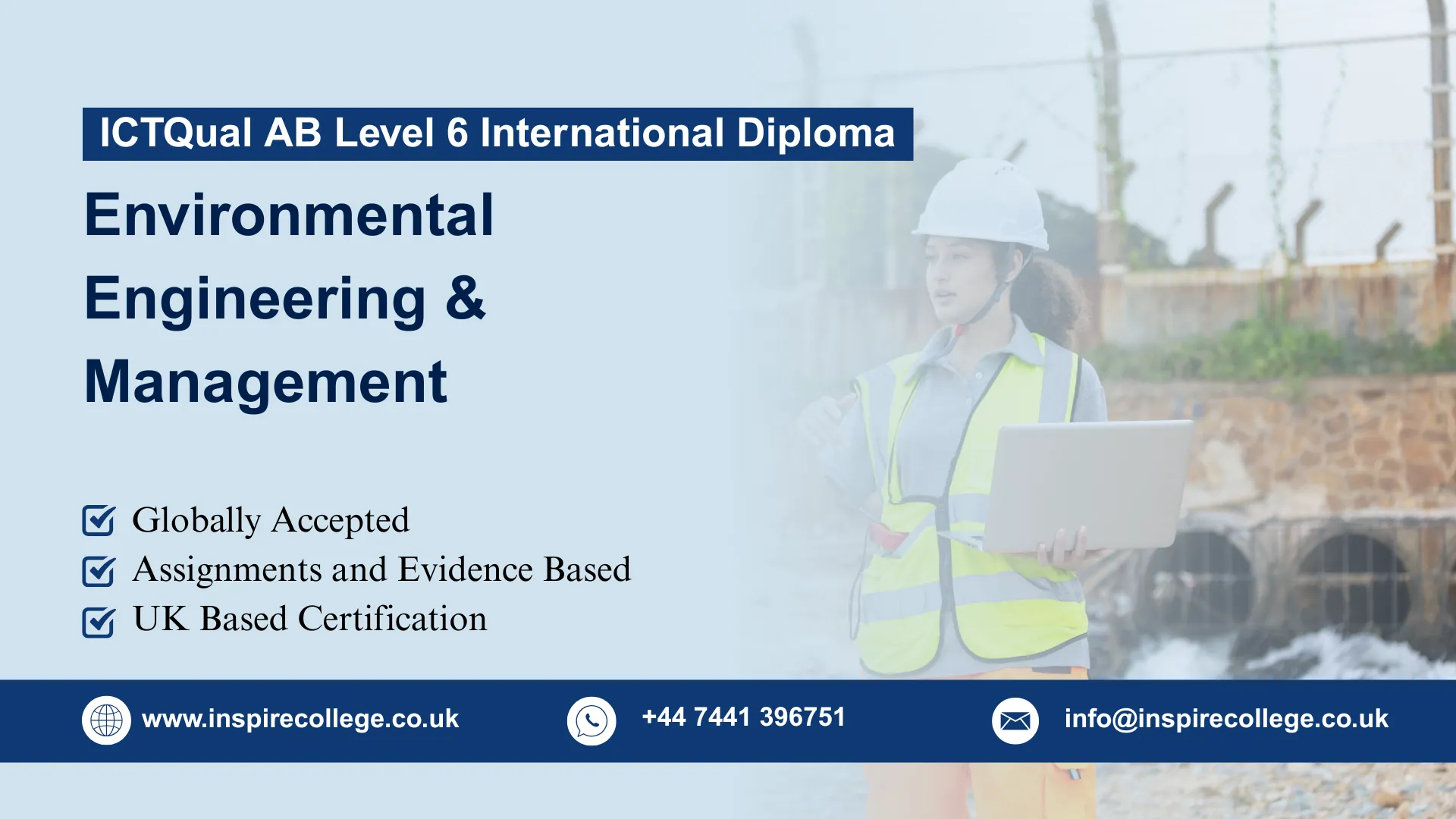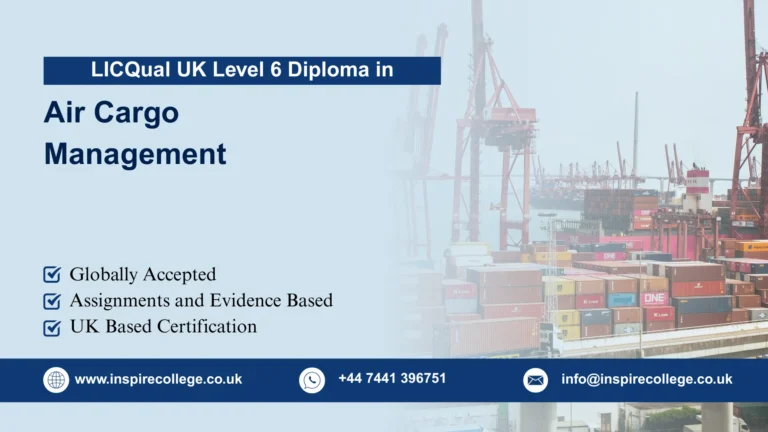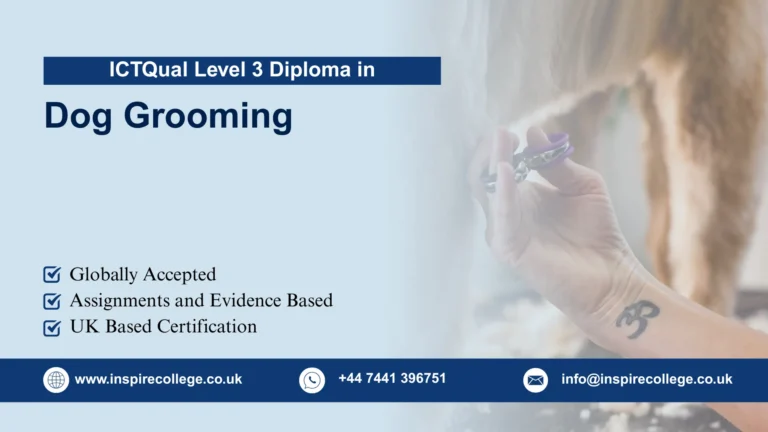
ICTQual AB Level 6 International Diploma in Environmental Engineering & Management
The ICTQual AB Level 6 International Diploma in Environmental Engineering & Management is a globally recognised qualification designed to equip learners with advanced knowledge and practical expertise in environmental engineering, sustainability, and resource management. This three-year, 360-credit programme provides a comprehensive understanding of environmental systems, pollution control, sustainable design, regulatory compliance, and strategic management of environmental projects.
Learners will gain the skills to analyse complex environmental challenges, design effective engineering solutions, and implement sustainable practices in industrial, municipal, and commercial contexts. The programme emphasises a combination of theoretical knowledge, applied research, and hands-on practical experience, enabling graduates to lead initiatives that minimise environmental impact, optimise resource efficiency, and support global sustainability goals.
Ideal for both fresh graduates and experienced professionals, this diploma prepares learners for diverse international career opportunities, including environmental consultancy, engineering management, sustainability project leadership, and regulatory compliance roles. Graduates will acquire competencies in environmental impact assessment, waste and water management, renewable energy integration, and sustainable infrastructure planning, positioning them to make a tangible impact on environmental sustainability.
By enrolling with our ICTQual AB Approved Training Centre, learners gain access to internationally recognised credentials, expert guidance, and comprehensive study materials. Completion of this diploma enhances career prospects both locally and globally, empowering professionals to address environmental challenges, implement sustainable engineering solutions, and contribute meaningfully to climate action and responsible resource management.
Take the next step in your professional journey and become a leader in environmental engineering and management with the ICTQual AB Level 6 International Diploma in Environmental Engineering & Management, designed for the growing global demand for skilled environmental professionals.
To enrol in the ICTQual AB Level 6 International Diploma in Environmental Engineering & Management, learners must meet the following criteria:
- Age Requirement: Learners must be at least 18 years old.
- Educational Background:
- A relevant Level 5 qualification in environmental science, engineering, sustainability, or related disciplines is preferred.
- Fresh learners with secondary or vocational education in science, engineering, or environmental studies are also eligible.
- Professional Experience:
- Experienced learners with 3–5 years or more of verifiable professional experience in environmental engineering, project management, sustainability initiatives, or consultancy are highly suited for advanced learning pathways.
- Practical experience in industrial, municipal, or commercial environmental management enhances readiness for strategic modules.
- Language Proficiency: Learners must demonstrate proficiency in English to effectively engage with course materials, assessments, and professional communication.
- Computer Literacy: Basic computer skills are required, including familiarity with MS Office, digital learning platforms, and environmental data analysis tools.
- Commitment to Learning: Learners must be dedicated to completing the three-year, 360-credit programme, encompassing theoretical modules, applied projects, practical assessments, and research work.
These entry requirements ensure learners are academically and professionally prepared to succeed in the programme, equipping them with the knowledge and skills to become leaders in environmental engineering, sustainability management, and strategic resource planning at an international level.
Mandatory Units
This qualification, the ICTQual AB Level 6 International Diploma in Environmental Engineering & Management, consists of 36 mandatory units.
Year 1 – Foundation of Environmental Engineering & Management
- Principles of Environmental Engineering
- Introduction to Environmental Science and Sustainability
- Environmental Legislation and Regulatory Compliance
- Environmental Impact Assessment (EIA) Fundamentals
- Waste Management and Pollution Control
- Water Quality Management and Treatment
- Air Quality Monitoring and Control
- Soil and Groundwater Protection
- Renewable Energy Systems and Applications
- Occupational Health, Safety, and Environmental Awareness
- Communication and Reporting in Environmental Management
- Professional Ethics and Responsibility in Environmental Practice
Year 2 – Applied Environmental Engineering & Management
- Advanced Environmental Risk Assessment
- Industrial Wastewater and Effluent Management
- Solid and Hazardous Waste Engineering
- Environmental Monitoring and Audit Techniques
- Sustainable Resource Management and Conservation
- Climate Change Mitigation and Adaptation Strategies
- Environmental Modelling and Data Analysis
- Green Building and Sustainable Infrastructure
- Environmental Management in Manufacturing and Energy Sectors
- Behavioural and Organisational Approaches to Environmental Safety
- Digital Tools and Technologies in Environmental Engineering
- Research Methods and Environmental Project Planning
Year 3 – Strategic Environmental Leadership & Management
- Strategic Environmental Management and Governance
- Integrated Environmental Management Systems (ISO 14001, ISO 50001)
- Environmental Policy Development and Implementation
- Sustainability Leadership and Corporate Social Responsibility (CSR)
- Environmental Risk Management in Large-Scale Projects
- Renewable Energy Project Management
- International Environmental Standards and Best Practices
- Environmental Innovation and Emerging Technologies
- Environmental Crisis Management and Emergency Planning
- Advanced Occupational Health & Environmental Wellbeing Strategies
- Independent Research Project in Environmental Engineering
- Capstone Project: Applied Environmental Engineering & Management
Learning Outcomes for the ICTQual AB Level 6 International Diploma in Environmental Engineering & Management 360 Credits – Three Years:
Year 1 – Foundation of Environmental Engineering & Management
Principles of Environmental Engineering
- Explain fundamental concepts and principles of environmental engineering.
- Analyse environmental challenges in industrial and urban contexts.
- Apply engineering solutions to minimise environmental impact.
- Demonstrate knowledge of environmental systems and processes.
Introduction to Environmental Science and Sustainability
- Understand the core concepts of environmental science and sustainability.
- Assess human impact on ecosystems and natural resources.
- Identify strategies for promoting sustainable development.
- Apply sustainability principles to engineering and management practices.
Environmental Legislation and Regulatory Compliance
- Explain key environmental laws, regulations, and compliance requirements.
- Analyse the role of regulatory frameworks in environmental protection.
- Ensure engineering and operational practices meet legal standards.
- Evaluate the impact of legislation on industry and project management.
Environmental Impact Assessment (EIA) Fundamentals
- Conduct preliminary environmental impact assessments.
- Identify potential environmental risks in projects and operations.
- Recommend mitigation measures to minimise environmental harm.
- Prepare basic EIA reports aligned with international standards.
Waste Management and Pollution Control
- Classify and manage different types of waste streams.
- Apply pollution control techniques for air, water, and soil.
- Implement waste minimisation and recycling strategies.
- Assess environmental impacts of waste management practices.
Water Quality Management and Treatment
- Understand water quality parameters and standards.
- Apply water treatment methods for industrial and municipal systems.
- Monitor and analyse water quality using standard techniques.
- Develop water management plans to ensure environmental compliance.
Air Quality Monitoring and Control
- Measure and evaluate air pollution levels.
- Apply air quality management and emission control strategies.
- Identify sources of pollutants and mitigation techniques.
- Prepare reports and recommendations for air quality improvement.
Soil and Groundwater Protection
- Analyse soil and groundwater contamination risks.
- Implement remediation and protection strategies.
- Apply monitoring techniques for soil and groundwater quality.
- Understand regulatory requirements for soil and groundwater management.
Renewable Energy Systems and Applications
- Explain principles of renewable energy technologies.
- Evaluate the feasibility of renewable energy systems.
- Integrate renewable solutions into engineering projects.
- Analyse environmental and economic benefits of renewable energy.
Occupational Health, Safety, and Environmental Awareness
- Identify workplace hazards and implement safety procedures.
- Apply environmental health and safety standards in engineering projects.
- Promote awareness of sustainability and safety practices.
- Develop risk mitigation strategies for operational safety.
Communication and Reporting in Environmental Management
- Prepare professional reports and documentation for environmental projects.
- Communicate technical information effectively to stakeholders.
- Apply data visualisation and presentation techniques.
- Demonstrate professional communication in team and project settings.
Professional Ethics and Responsibility in Environmental Practice
- Understand ethical responsibilities in environmental engineering and management.
- Analyse ethical dilemmas in sustainability and engineering projects.
- Apply ethical decision-making in professional practice.
- Promote responsible and sustainable engineering solutions.
Year 2 – Applied Environmental Engineering & Management
Advanced Environmental Risk Assessment
- Conduct comprehensive risk assessments for environmental projects.
- Evaluate potential hazards and their impact on ecosystems.
- Recommend mitigation strategies for environmental risks.
- Apply international risk assessment frameworks in real-world scenarios.
Industrial Wastewater and Effluent Management
- Design wastewater treatment and effluent management systems.
- Monitor industrial discharges to comply with regulatory standards.
- Implement sustainable wastewater treatment solutions.
- Analyse environmental impact of industrial effluents.
Solid and Hazardous Waste Engineering
- Classify, handle, and dispose of solid and hazardous wastes safely.
- Design engineering solutions for waste treatment and recycling.
- Implement regulatory compliance measures for hazardous materials.
- Evaluate environmental and health impacts of waste engineering practices.
Environmental Monitoring and Audit Techniques
- Conduct environmental audits for compliance and sustainability.
- Apply monitoring techniques for air, water, and soil quality.
- Analyse data to identify trends and areas for improvement.
- Prepare audit reports and recommendations for stakeholders.
Sustainable Resource Management and Conservation
- Apply principles of resource efficiency and conservation.
- Develop strategies for sustainable utilisation of natural resources.
- Evaluate environmental and economic impacts of resource management.
- Promote circular economy principles in engineering projects.
Climate Change Mitigation and Adaptation Strategies
- Analyse the causes and impacts of climate change.
- Design mitigation strategies for greenhouse gas reduction.
- Develop adaptation plans for climate resilience.
- Integrate climate considerations into project and organisational planning.
Environmental Modelling and Data Analysis
- Use modelling tools to predict environmental impacts.
- Analyse environmental data to inform decision-making.
- Apply statistical and computational methods in sustainability studies.
- Develop reports based on quantitative and qualitative analysis.
Green Building and Sustainable Infrastructure
- Design environmentally sustainable buildings and infrastructure projects.
- Implement energy-efficient and low-impact construction practices.
- Apply green certification standards (e.g., LEED, BREEAM).
- Evaluate lifecycle environmental impacts of infrastructure projects.
Environmental Management in Manufacturing and Energy Sectors
- Apply environmental engineering principles in industrial operations.
- Design pollution control and sustainability strategies for manufacturing.
- Implement energy efficiency and waste reduction initiatives.
- Monitor environmental performance and compliance in industrial sectors.
Behavioural and Organisational Approaches to Environmental Safety
- Promote safety culture within organisations.
- Implement behavioural strategies to enhance environmental compliance.
- Analyse organisational practices to reduce environmental risks.
- Develop training and awareness programmes for employees.
Digital Tools and Technologies in Environmental Engineering
- Utilise software and digital platforms for environmental monitoring.
- Apply GIS, remote sensing, and modelling tools for sustainability analysis.
- Implement data-driven solutions in environmental management.
- Evaluate technological solutions for environmental engineering challenges.
Research Methods and Environmental Project Planning
- Develop research proposals and project plans for environmental initiatives.
- Apply qualitative and quantitative research methods.
- Analyse and interpret research findings for decision-making.
- Prepare structured project plans and reports aligned with sustainability goals.
Year 3 – Strategic Environmental Leadership & Management
Strategic Environmental Management and Governance
- Develop and implement strategic environmental management plans.
- Analyse governance frameworks and their impact on environmental performance.
- Align organisational goals with environmental sustainability objectives.
- Lead initiatives promoting sustainable practices across sectors.
Integrated Environmental Management Systems (ISO 14001, ISO 50001)
- Implement and manage ISO-compliant environmental management systems.
- Monitor performance against international standards.
- Conduct audits and continuous improvement of environmental systems.
- Promote organisational sustainability culture and compliance.
Environmental Policy Development and Implementation
- Analyse existing environmental policies and regulations.
- Develop and implement organisational environmental policies.
- Evaluate policy effectiveness and compliance.
- Advise stakeholders on policy alignment with sustainability goals.
Sustainability Leadership and Corporate Social Responsibility (CSR)
- Lead sustainability initiatives in organisations.
- Develop CSR strategies aligned with environmental goals.
- Promote ethical and socially responsible engineering practices.
- Measure and report on sustainability outcomes and impact.
Environmental Risk Management in Large-Scale Projects
- Identify and manage environmental risks in complex projects.
- Develop mitigation and contingency plans.
- Apply risk management frameworks in multi-stakeholder environments.
- Monitor and review risk strategies for effectiveness.
Renewable Energy Project Management
- Plan and manage renewable energy projects.
- Integrate sustainability principles into project execution.
- Evaluate economic and environmental feasibility of projects.
- Monitor project performance and compliance with regulations.
International Environmental Standards and Best Practices
- Apply global environmental standards in engineering projects.
- Benchmark projects against international best practices.
- Promote environmental stewardship in multi-national operations.
- Ensure compliance with international sustainability frameworks.
Environmental Innovation and Emerging Technologies
- Identify emerging technologies in environmental engineering.
- Evaluate innovative solutions for waste, water, energy, and pollution control.
- Integrate technological advances into sustainability strategies.
- Lead initiatives for technological adoption in environmental management.
Environmental Crisis Management and Emergency Planning
- Develop emergency response plans for environmental incidents.
- Implement crisis management strategies in industrial and municipal settings.
- Assess and mitigate environmental hazards during emergencies.
- Coordinate multi-stakeholder response and recovery efforts.
Advanced Occupational Health & Environmental Wellbeing Strategies
- Implement advanced health and safety strategies in environmental projects.
- Promote occupational wellbeing alongside sustainability goals.
- Conduct risk assessments for employee safety in environmental operations.
- Develop training programmes for workplace safety and environmental awareness.
Independent Research Project in Environmental Engineering
- Conduct independent research on a specialised environmental topic.
- Apply research methodology, data analysis, and project planning.
- Present findings in a professional and structured report.
- Contribute original insights to environmental engineering practice.
Capstone Project: Applied Environmental Engineering & Management
- Integrate knowledge and skills from all modules into a comprehensive project.
- Solve real-world environmental engineering and management challenges.
- Demonstrate strategic planning, project execution, and sustainable solutions.
- Present and defend findings before an expert panel.
The programme is designed for a diverse range of learners, from fresh graduates to seasoned professionals, aiming to develop expertise in environmental engineering, sustainability, and strategic management.
1. Fresh Graduates and Entry-Level Learners
- Individuals aged 18 years or older with a strong interest in environmental science, engineering, and sustainability.
- Those who have completed relevant secondary or vocational education and wish to gain an internationally recognised qualification.
- Learners eager to build a solid foundation in environmental systems, pollution control, renewable energy, and sustainability practices.
- Candidates aiming to enter professional roles in environmental consultancy, engineering firms, municipal sustainability projects, or industrial environmental management.
- Individuals seeking practical skills that align with international environmental standards and regulatory frameworks.
2. Early Career Professionals
- Engineers, environmental technicians, or junior managers seeking to advance knowledge and qualifications in environmental engineering and management.
- Professionals aiming to specialise in areas such as renewable energy, waste and water management, pollution control, and sustainable infrastructure.
- Learners looking to enhance career prospects, technical competence, and leadership potential in sustainability-focused organisations.
- Individuals committed to applying theoretical knowledge in practical, real-world environmental and engineering projects.
3. Experienced Environmental Professionals
- Professionals with 3–5 years or more experience in environmental engineering, industrial sustainability, or regulatory compliance roles.
- Candidates seeking to formalise and validate their expertise through an internationally recognised Level 6 diploma.
- Learners aspiring to progress into senior management, consultancy, or strategic leadership roles in environmental projects and organisations.
- Professionals focused on international mobility and long-term career growth in environmental engineering and sustainability sectors.
- Individuals aiming to broaden expertise in policy development, corporate social responsibility (CSR), environmental risk management, and innovation.
4. Career Switchers and Sustainability Enthusiasts
- Professionals from related technical or engineering fields wanting to transition into environmental engineering and management.
- Individuals passionate about sustainability, climate change, and environmental stewardship.
- Learners motivated to combine theoretical understanding with hands-on practice and strategic leadership skills to achieve industry-ready competence.
Key Attributes of Ideal Learners
- Commitment to completing a three-year, 360-credit programme.
- Strong problem-solving, analytical, and technical skills.
- Effective communication and teamwork abilities for collaborative projects and environmental initiatives.
- Willingness to stay updated with emerging environmental technologies, global regulations, and sustainability trends.
- Dedication to upholding safety, quality, and ethical standards in all environmental engineering operations.
As an ICTQual AB Approved Training Centre, we provide learners with two flexible pathways to achieve the Level 6 International Diploma in Environmental Engineering & Management. All learners must register with our centre to enrol and access course materials.
Route 1 – Experienced Professionals
This route is designed for learners with at least 6 years of verifiable professional experience in environmental engineering, sustainability management, or related sectors.
- Learners submit evidence of prior projects, responsibilities, and achievements demonstrating competence in:
- Environmental engineering practices
- Waste and water management
- Renewable energy systems
- Regulatory compliance and sustainability leadership
- Our centre evaluates the learner’s existing knowledge and skills against the diploma’s learning outcomes.
- Targeted guidance or additional training is provided if any gaps are identified.
- Successful verification leads to diploma certification without completing all 36 assignments, enabling fast-tracked recognition of professional expertise.
Route 2 – Fresh Learners
This route is for learners without prior professional experience in environmental engineering or sustainability.
- Learners must complete the full three-year, 360-credit programme, including:
- All 36 assignments
- Practical assessments
- Case studies and project work
- Assessments are structured to demonstrate theoretical knowledge and practical application in real-world environmental engineering scenarios.
- Upon successful completion, learners are awarded the ICTQual AB Level 6 International Diploma in Environmental Engineering & Management.
Both routes provide a globally recognised, industry-relevant qualification, enabling learners to either:
- Validate their professional experience or
- Gain comprehensive expertise to advance careers in environmental engineering, sustainability, and strategic resource management.
Register Now
FAQs for ICTQual AB Level 6 International Diploma in Environmental Engineering & Management






